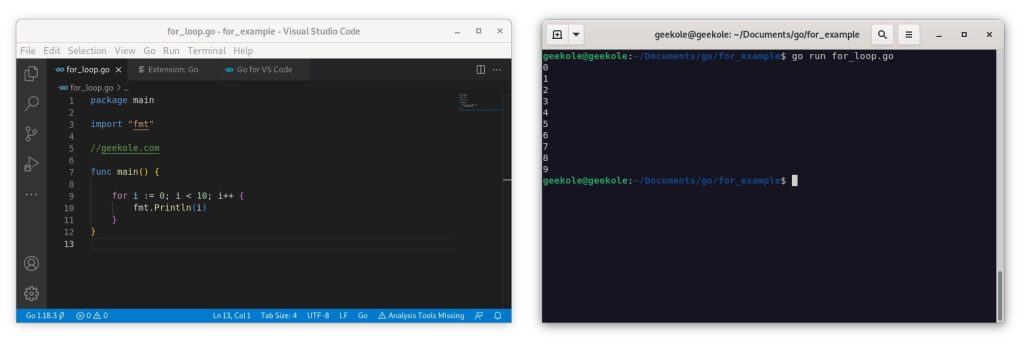Golang has the classic version of the for loop with three components separated by semicolons:
initial ; condition ; post
package main
import "fmt"
//geekole.com
func main() {
for i := 0; i < 10; i++ {
fmt.Println(i)
}
}
package main
import "fmt"
//geekole.com
func main() {
for i := 0; i < 10; i++ {
fmt.Println(i)
}
}
package main
import "fmt"
//geekole.com
func main() {
for i := 0; i < 10; i++ {
fmt.Println(i)
}
}
The output:
$ go run for_loop.go
0
1
2
3
4
5
6
7
8
9
$ go run for_loop.go
0
1
2
3
4
5
6
7
8
9
$ go run for_loop.go 0 1 2 3 4 5 6 7 8 9

You can use the for loop with a single condition:
package main
import "fmt"
//geekole.com
func main() {
i := 0
for i < 5 {
fmt.Println(i)
i = i + 1
}
}
package main
import "fmt"
//geekole.com
func main() {
i := 0
for i < 5 {
fmt.Println(i)
i = i + 1
}
}
package main
import "fmt"
//geekole.com
func main() {
i := 0
for i < 5 {
fmt.Println(i)
i = i + 1
}
}
The output:
$ go run for_loop.go
0
1
2
3
4
$ go run for_loop.go
0
1
2
3
4
$ go run for_loop.go 0 1 2 3 4
Or you can use the for loop with no condition and using a break sentence:
package main
import "fmt"
//geekole.com
func main() {
i := 0
for {
fmt.Println(i)
i = i + 1
if i > 5 {
fmt.Println("break")
break
}
}
}
package main
import "fmt"
//geekole.com
func main() {
i := 0
for {
fmt.Println(i)
i = i + 1
if i > 5 {
fmt.Println("break")
break
}
}
}
package main
import "fmt"
//geekole.com
func main() {
i := 0
for {
fmt.Println(i)
i = i + 1
if i > 5 {
fmt.Println("break")
break
}
}
}
The output:
$ go run for_loop.go
0
1
2
3
4
5
break
$ go run for_loop.go
0
1
2
3
4
5
break
$ go run for_loop.go 0 1 2 3 4 5 break
And, of course, a for loop can include a continue statement, which will skip the rest of the code block within the for loop.
package main
import "fmt"
//geekole.com
func main() {
for i := 0; i < 10; i++ {
if i < 5 {
continue
}
fmt.Println(i)
}
}
package main
import "fmt"
//geekole.com
func main() {
for i := 0; i < 10; i++ {
if i < 5 {
continue
}
fmt.Println(i)
}
}
package main
import "fmt"
//geekole.com
func main() {
for i := 0; i < 10; i++ {
if i < 5 {
continue
}
fmt.Println(i)
}
}
The output:
$ go run for_loop.go
5
6
7
8
9
$ go run for_loop.go
5
6
7
8
9
$ go run for_loop.go 5 6 7 8 9
If you have noticed, in golang parentheses are not used in the for loop, but the braces { } are always required.
Golang examples: https://geekole.com/golang/